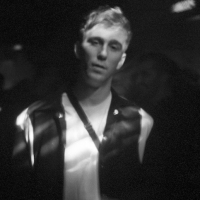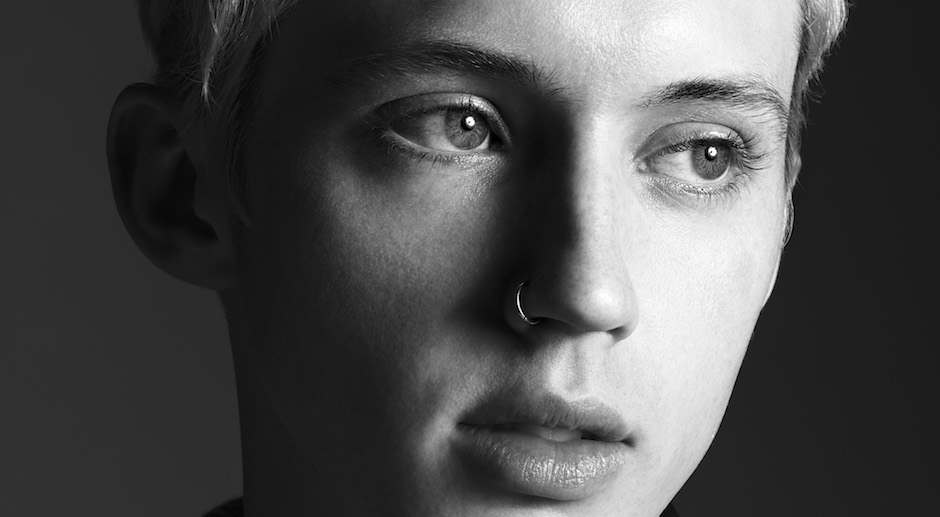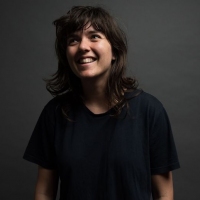 Meet the UK's most exciting musical chameleon, SG LewisWe talk to the continually evolving London musician about UK club culture, live shows and his three-part debut album.
Meet the UK's most exciting musical chameleon, SG LewisWe talk to the continually evolving London musician about UK club culture, live shows and his three-part debut album.

A Blooming Popstar: Troye Sivan on Gordi, Queerness & Perth
The Perth-raised musician sets his sights to the top with his bold and confident second album Bloom, out August 31 via EMI.
Header Photo: Troye Sivan, by Hedi Slimane.
"I feel so lucky," Troye Sivan beams over the phone from Sydney, his voice marked with excitement despite an early morning rise for breakfast television appearances and a long press day ahead. There's a good reason for his excitement though, as his forthcoming second album Bloom, one of the most highly awaited for 2018, is out in just under two months. Even the sheer mention of the album adds another level of excitement in his voice. "It's been a really, really fun journey to allow myself the space to grow and allow myself the opportunity to present who I am and my perspectives," he says. "Also how I've grown up a bit."
Summarised, Bloom is a ten-track exploration of Troye Sivan; his experiences and emotions wrapped in triumphant, stadium-set pop anthems and tender guitar-backed moments alike, often produced and written in collaboration with names including Bram Inscore, Allie X and Leland - a trio who have been trusty collaborators since the Blue Neighbourhood days. It's a complicated, yet focused and polished parade of Troye Sivan and everything he encompasses, from his musical brilliance and his confidence, fearlessness and grace, to the more intimate moments of his life and his queerness, the latter in particular being a central theme to many of the album's touching moments as the openly gay, 23-year-old popstar lyrically walks us through his ups and downs.
Seventeen, the album's delicate and airy opener, is the perfect example of Bloom's openness and honesty. "I went out looking for love when I was seventeen, maybe a little too young, but it was real to me," he sings in the single's chorus, reflecting on an underaged experience with an older man from a dating app - a memory mirrored in many young gay men growing up in the age of Grindr and Tinder. "And in the heat of the night, saw things I'd never seen, oh seventeen." Elsewhere on the record, tracks like the stadium-sized leading single My My My! spread messages of liberation and personal freedom through tall-standing vocals and maximalist, Max Martin-like productions, while the beautifully stripped-back The Good Side and What A Heavenly Way To Die touch on the more intimate moments of Troye Sivan's life - the latter of which influenced by The Smiths' There Is a Light That Never Goes Out, a single that while on a road trip with his partner, Jacob Bixenman, made the pair picture a future as "two old gay guys" nostalgically listening back and reminiscing on their past adventures.
At one moment, every facet Troye Sivan explores in Bloom - his identity, experiences, emotions and queerness - is condensed into one song: the album's spectacular title-track. In its lyrics, Sivan celebrates the act of giving yourself to the one you love (or flowers, depending on who you talk to); its lyrics perhaps the most visual of the whole record. "I need you to tell me right before it goes down, promise me you'll hold my hand if I get scared now," he sings in the single's pre-chorus, his voice echoing above a synthy, yet quite restrained production. "Might tell you to take a second, baby, slow it down." Following the cue of artists such as Years & Years frontman Olly Alexander, the open and unashamed queerness of Troye Sivan is something that artists couldn't do even just years ago. He's detailing the highs and the lows of growing up gay on Bloom, mixing lyrical storytelling of themes often unexplored in music - particularly mainstream pop - with colourful imagery and his confident and proud image without 'toning it down' to find mainstream success.
Even when he released his first major single, 2014's Happy Little Pill, Troye Sivan seemingly had his path to stardom mapped out. Happy Little Pill, which eventually wound up on his TRXYE EP, found itself towards the top of commercial charts both locally and overseas, and it wasn't uncommon for his then-cult-like fanbase to grab onto everything the musician was involved with - no matter how small - and turn it into something massive (for a perfect example, his fans crashed our site once upon a time when we premiered an official remix of the single, and again when we interviewed him months later). Blue Neighbourhood, his gold-certified, top-ten-charting debut album, gave us this first glimpse of what I'm going to call 'popstar Troye'. Although still restrained by a slight shyness, it showcased the promise Sivan held as one of the country's eventual leading names in music.
Bloom is, in my opinion, 'popstar Troye' at his most triumphant. My My My!, for example, introduces Troye Sivan as a musician whose arrival should be marked with horns blaring, and even the smallest things like his confident popstar stride - something he showed off when he was invited to join Taylor Swift on stage at Los Angeles’ Rose Bowl - boasts a certain swagger that I don't think you could picture from baby-faced Sivan back in 2014. Even the album's most tender moments shine with this defined, matured and self-assured slickness that you'd expect from pop royalty. "Maybe this is the Jewish in us, but my dad raised me to be really unapologetically proud about who you are," says Sivan in an album quote. Bloom is Sivan at his most unapologetically proud and even if you don't know him personally - which I don't - you get a sense that it's him. It's his identity. His stories. His experiences. His emotions.
Bloom is a raw and honest representation of Troye Sivan. It's a raw and honest representation of one of the world's leading and most important popstars, and he's not going away any time soon.

Troye Sivan. Photo by Jules Faure.
In comparison to your first album, Bloom feels a lot more confident and open - it’s generally more pop-focused, it’s more open and honest, and not to discredit Blue Neighbourhood, but it feels more… you.. if that makes sense. What inspired you to create this album?
I really wanted the album to cover my identity, but I think the thing that drove me to making this album what it is as was music discovery. I took a little bit of a break for a few months after touring the first album and writing the second one, and during that time, I was head over heels in love with artists like The Velvet Underground, people like The Smiths, This Mortal Coil... I was just listening and taking in all this stuff, and then it inspired me to start writing the album.
You mentioned that you wanted the album to have a strong sense of your identity. How did you go about intertwining the album with your identity?
I think it’s one of those things that I wanted to happen naturally – you know? I’m writing on all the songs, and I felt a lot more confident in the studios calling the shots a little bit and suggesting things. I felt a little more confident actually taking control of the session and so I think in that, my perspective and identity came through a lot more in the music.
I guess a bit of your identity would be Perth now, right?
Yeah definitely.
I’m from Perth and still live here, so I definitely know how it feels to grow up here feeling disconnected and away from everything. How do you think that growing up in Perth has shaped your music and who you are today?
I think like anyone’s childhood does, [growing up in Perth] has definitely influenced almost everything in my life today. It influenced the way I interact with people, the people I gravitate towards – all those sorts of things. I completely feel Perth in like, everything I do, and in a very positive way.
I think Perth really sets people up in a great way. It sets a great foundation for what’s important in life – family, friends. There’s not a lot of bullshit in Perth, and that’s a great thing when it comes to working in the music industry, especially compared to much more full-on places.
You’ve mentioned before that in interviews that growing up, you didn’t really know what life looked like as a queer male. But now with this album, the lyrics, the stories in the lyrics, and the visuals – like the Bloom video – you’re showing your own queer fans your interpretation of this exact thing. How does it feel to be in that position?
I feel so lucky. We talk about all the time how important representation is, and I think about the few moments I had in life when I was a kid, and I saw queer people on the TV and heard them on the radio. It really shaped me and got me thinking about my own identity. So to be a part of that and to be able to celebrate that on a massive public stage is an honour I’m super happy to have, and it’s something I take pretty seriously.
Do you feel like have extra responsibilities you have to uphold being in this position?
I try not to think about it too much because it can very easily get overwhelming. But yeah, I do hold myself to a high standard. I just wanna be a good person and be nice to everyone. It's something everyone should do, but they’re the kind of things that I strive for being in this position.
I think an important thing is, though, that I make mistakes and everybody else does too. When that happens though, I just want to learn and grow from these mistakes - I think that's really important.
With artists like yourself, Kevin Abstract, SOPHIE, Kehlani and all these different queer artists from so many different places, I feel like the representation of queer musicians has really shifted – even within the last two years. Do you agree that the landscape has changed for queer musicians?
It definitely has, yeah. We’re in a much, much better shape than we were even two years ago like you said. It’s really inspiring, and I’m really happy because for a long time, we were sorta looking for a... poster child of the community. I don’t think that exists, because there are so many of us and we’re all so diverse - everyone comes from different backgrounds and have different experiences. You can't just choose one person to represent everyone else. I feel like now, in 2018, we’re finally starting to see and hear that diversity. Even just to be able to list the names you’ve just listed is like, so cool.
Are those the type of artists you look up to for inspiration to do what you’re doing now on your own level?
Completely, yeah. I look to people like that all the time. It’s really cool to have that sense of kinship between people who are in the same community that I am, that are all in the same industry that I am. It’s incredibly cool and I'm so happy it's like this.
Reflecting on Blue Neighbourhood and looking at yourself now – your music, your identity and so on – how does it feel? Like, what does Blue Neighbourhood feel like looking and listening back to it?
It kinda feels like reading an old diary from when you were younger, you know? There are moments of cringing at yourself a little bit, but also moments that are really tender and sweet. It’s a mixed bag a little bit. Overall though, I guess it feels like a time capsule of myself at this time.
Now, listening to Bloom, do you think that Blue Neighbourhood you could foresee your evolution into who you are now?
Totally, yeah. Had I have known how to make this album back then for the first time, I probably would’ve. I can definitely hear all of my influences and just knowing myself, I would be able to listen to the album and work out why I did all the things that I did back then.

Troye Sivan. Photo by Jules Faure.
I know almost every interview you’ve done so far has talked about Ariana, but I wanted to talk about Gordi. What is it that drew you to her?
Can We Work It Out by Gordi was easily one of my most played songs on Spotify that year. I’m just a really big fan of her. I think her songwriting is brilliant, I think her voice is sensational, and her taste in production is just brilliant – everything. I’m a really, really big fan of her.
When I was given the opportunity to work with her I really jumped at it. Her bridge on the song that we did together is one of my favourite moments on the whole album.
What was the experience of working with her then?
It was really, really fun. I hadn’t started writing the second album yet. I was still on holidays basically. She was in LA at the time and my label A&R was like “hey, do you want to go in with her and just kinda see what happens?” and I was like “definitely – I don’t want to waste this opportunity.”
We went in with no pressure to write anything because I wasn’t even in album writing mode yet, but I was like “yeah, let’s just see what happens.” We had a few hours together, and normally I’m quite a maximalist when it comes to production. But instead, we wrote to this piano. I was like “hey, should we build up production?” but I didn’t even know what the album was gonna sound like yet, so I didn’t really know where to begin. I was just like “hey, let’s just do a piano and vocal track with no click track or anything – just the foundations of the song itself,” and that one take is what you hear on the album version.
So wait – the Gordi collab is just a one take of you guys?
Yep, just the one.
Wow, that’s crazy to hear on such a big record.
Yeah, we ended up layering some stuff and adding some background harmonies and things like that, but the lead take is just a single take.
Is there any difference in the process of writing with someone like Gordi verses writing with someone like Ariana Grande – considering they’re two completely different acts in almost every way?
I think that’s one of the things I love most about working in music. People have different processes and stuff like that, but at the end of the day, we’re all just in it because we love music and we love what we do. When you strip away all the craziness of the fact that Ariana Grande is Ariana Grande, it’s just two people hanging out together trying to make the best song they possibly can – and that’s the exact same thing I was doing with both Ariana and Gordi.
One more question, just so I don’t get attacked by your legion of Australian fans – do you have any Australian tour plans on the horizon?
Most definitely, yeah. I’m starting the tour in the US, and then, to be completely honest, I don’t actually know the plan after that. But Australia is definitely the top of the list and I am so, so, so excited to be back – it’s been way too long. I miss it.
Troye Sivan's second album Bloom is out August 31 via EMI Music Australia - pre-order it HERE.
 Meet the UK's most exciting musical chameleon, SG LewisWe talk to the continually evolving London musician about UK club culture, live shows and his three-part debut album.
Meet the UK's most exciting musical chameleon, SG LewisWe talk to the continually evolving London musician about UK club culture, live shows and his three-part debut album.
 Talking vulnerability, 'hopefulessness' and the DIY pathway with Courtney BarnettCatch the internationally acclaimed Australian musician touring her new album with headline shows over the next month.
Talking vulnerability, 'hopefulessness' and the DIY pathway with Courtney BarnettCatch the internationally acclaimed Australian musician touring her new album with headline shows over the next month.